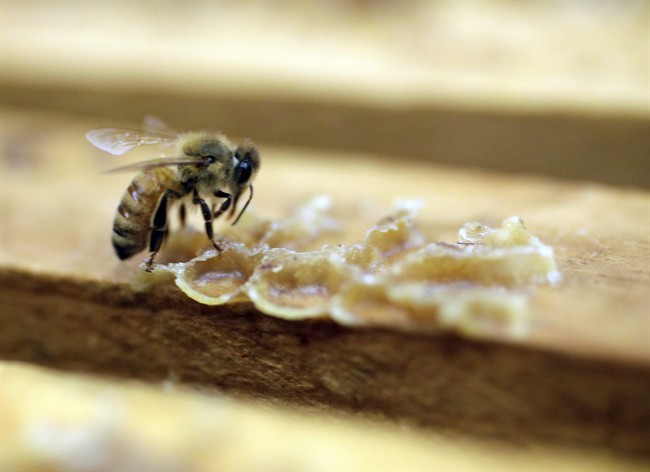TORONTO – It’s a beekeeper rebellion.

Alberta beekeepers have broken away from the swarm in opposing a class-action lawsuit filed by their Ontario counterparts.
Some Canadian beekeepers have blamed increasing bee deaths on a family of pesticides called neonicotinoids. In 2013, the European Union even issued a temporary ban on the use of NNIs.
In September, a group of Ontario beekeepers announced that it would be filing a class-action lawsuit against NNI manufacturers Syngenta and Bayer. Beekeepers from around the country have since expressed their support.
But on Sept. 17, the Alberta Beekeepers’ Commission (ABC) issued a press release stating that it did not support the suit.
READ MORE: Silence of the bees: ‘It has to stop. It just has to stop.
“The Alberta Beekeepers Commission recognizes that the use of certain agro chemicals can adversely affect honeybees, but also recognizes the benefits of using seed treatment technology in agriculture,” the statement read. “In particular, compared to the organophosphates and foliar applications of pesticides previously used, seed treatment technology significantly reduces honeybee exposure to pesticides.”
Rod Scarlett, executive director of the Canadian Honey Council said that his organization believes that what’s needed is a meeting between farmers and beekeepers, which may be similar to the belief held by the ABC.
“It’s a fairly regionalized issue,” Scarlett said.
Scarlett is referring to the 2012-2013 investigation by Health Canada’s Pest Management Regulatory Agency (PMRA).
Following complaints by beekeepers in Ontario and Quebec, the PMRA investigated the high mortality rates in the spring and summer of 2012 from 79 beekeepers across 322 bee yards. It concluded that the majority of the deaths were attributable to exposure to insecticides.
“We know pesticides kill bees. That’s a no-brainer because that’s what they’re designed to do because bees are insects,” Scarlett said.
“But what we’re trying to do is find a way where we mitigate the risks so farmers don’t have to change their approach, that beekeepers are provided safeguards, so their stock is safe.”
Such ways include seed treatment with lubricants, designed to reduce the NNI dust in the air. This was part of the best management practices of pesticide spraying brought on by the PMRA’s 2013 investigation.
In a February parliamentary hearing, Kevin Nixon, the Alberta delegate to the Canadian Honey Council, Alberta Beekeepers Commission, said that, “In Alberta we do not seem to have many agro pesticide incidents. There have been a couple of isolated incidents, but…We do not see the neonicotinoid incidents other regions have seen even though the same products are being used on canola, potatoes and corn in Alberta.”
READ MORE: Beekeepers warn 6/10 of Ontario’s bees died during harsh winter
But some beekeepers say that canola fields aren’t as dangerous to bees as corn fields are. And canola is what is widely planted in Alberta.
Are beekeepers being hypocritical?
Scarlett also feels that it’s somewhat hypocritical of beekeepers to ask farmers to change their practices.
“As beekeepers, it’s pretty difficult for us to mandate what farmers do when we use pesticides in our hives,” Scarlett — who has never been a beekeeper — said. “The same companies that are getting sued are the same companies that are developing products or have products for beekeepers to use in-hive…like varroa products.”
Except, according to Tibor Szabo, an Ontario beekeeper and first vice-president of the Ontario Beekeepers’ Association, it’s not the same. The pesticides that are being used aren’t impacting other farmers.
“Beekeepers are farmers. And no farmer should take out the farmer beside them regardless of what they’re doing,” Szabo said.
Tim Wendell, owner of Wendell Honey Farm which operates in both Saskatchewan and Manitoba, said that he will likely add his name to the lawsuit.
“It’s really not about the money for me. It’s just about the issue,” he said.
But Wendell saw some losses himself. In 2013, he had a bee yard across from a corn field. When his workers went out to harvest the honey, they were shocked to find that there were no bees in the honey boxes. Though it’s not unusual to have some boxes without bees, it was extremely unusual to have no bees.
Wendell called the PMRA. Interestingly, after a bad winter the year before, Wendell had to get some hives from another beekeeper — in Ontario. Could the hives have been compromised before getting to Wendell? Wendell can’t be sure, but what he does know is that the PMRA did also find NNIs in the soil, the water and the pollen near his hives.
“Bees are probably very similar to the canary in the coal mine,” Wendell said. “They are the flying dust mop. They pick up everything in the environment.”
Wendell acknowledged that the chemical companies didn’t want to harm the bees, but that it’s happening anyway.
As for the perception that disagreement exists among beekeepers, Wendell said it’s more that the damage isn’t being felt uniformly across the country.
READ MORE: U.S. wildlife refuges phasing out GMO crops, some pesticides to help bees
“I think the situation out here is not bad enough for us to take up arms,” he said. “We have to co-exist in an ag community. We have our bees on landowners’ property. These same landowners are trying to be in business and they’re growing the crops that are treated with the neonics. So…we don’t want to create bad feelings. And I don’t think the Ontario people are trying to do this either.
“I think they’re trying to get the message out to the chemical companies: you need to do something about this.”
Requests by Global News for comment from the Alberta Beekeepers’ Commission went unanswered.




Comments